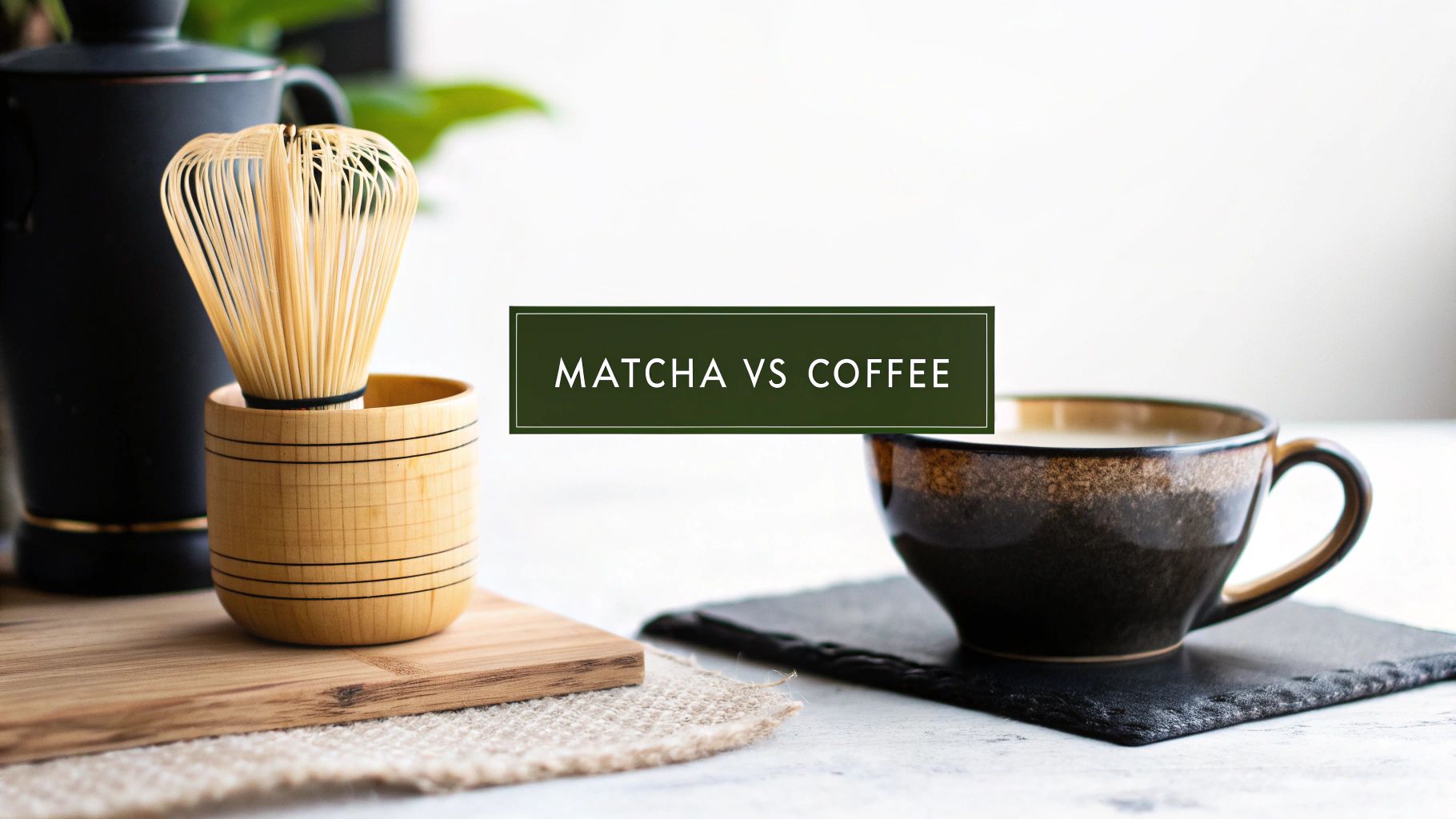When you're trying to decide between matcha and coffee, it really boils down to what kind of energy you're after. If you need a fast, sharp kick to get going, coffee is a reliable choice. But if you’re looking for a smooth, focused energy that lasts without the dreaded crash, matcha is almost certainly the better pick.
A Guide to Choosing Your Daily Brew
Figuring out if matcha is better than coffee isn't a simple yes-or-no question. It’s more about matching your drink to what your body needs and what your day demands. So many of us grab a coffee purely out of habit, looking for that familiar jolt to shake off the morning cobwebs. And while it works, that burst of energy often brings along jitters, a touch of anxiety, and that all-too-familiar slump a few hours later.
Matcha, on the other hand, works differently. It delivers a clean, steady energy that sharpens your focus and keeps you feeling clear-headed for hours. This guide isn't about pitting one against the other as 'good' versus 'bad'. Instead, we'll get into what makes each drink unique—from how they deliver caffeine and their health benefits to the daily rituals they inspire.
This infographic gives a great visual summary of the nutritional powerhouses that make matcha stand out.
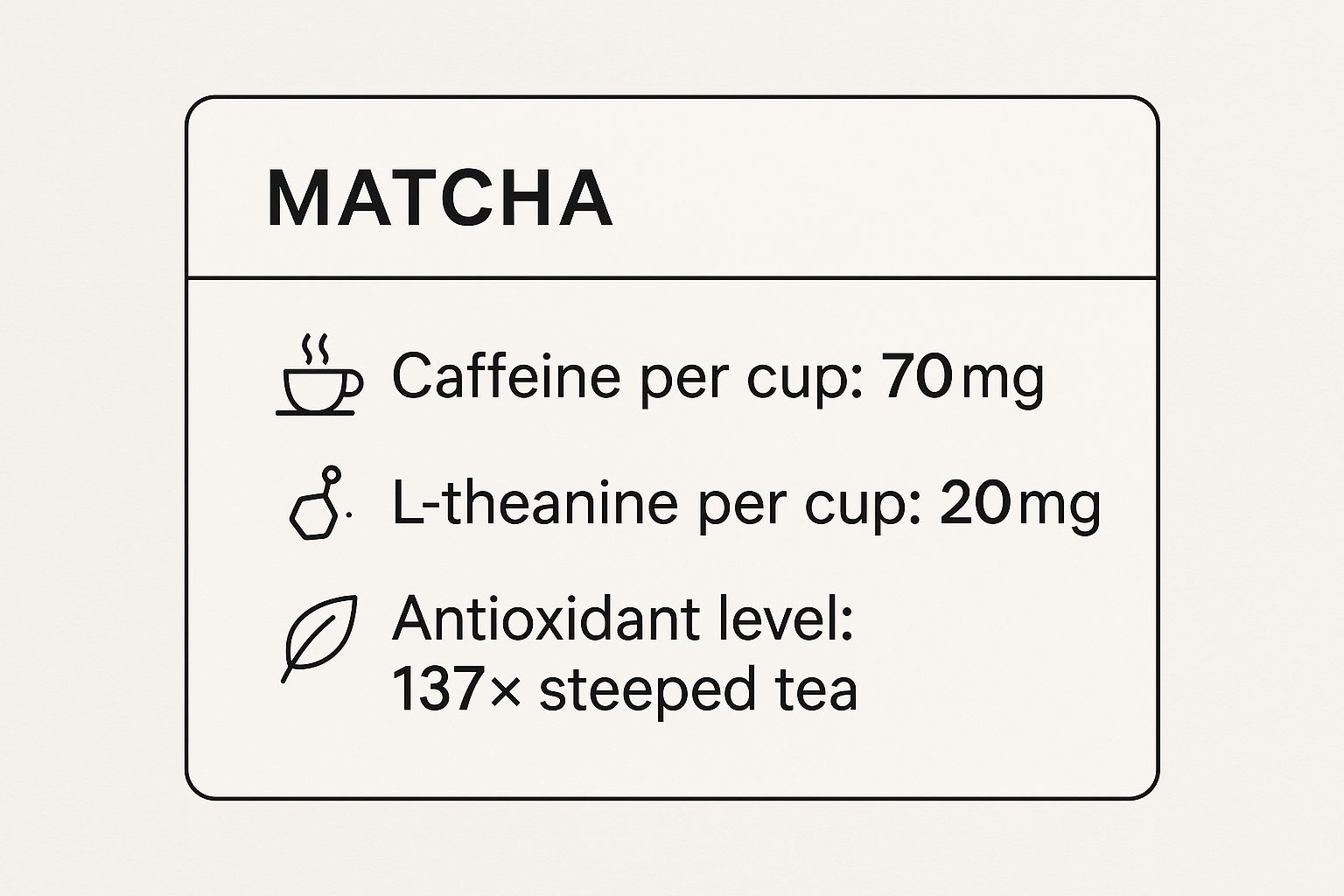
It's the unique combination of moderate caffeine, a serious dose of L-theanine, and an incredible amount of antioxidants that gives matcha its signature 'calm-alert' feeling. Once you understand these core differences, you can choose a drink that genuinely works for your body and mind. You'll quickly see why a premium option like Amatsu Matcha's Pure ceremonial grade matcha is the perfect way to begin a better energy ritual. For an even more detailed breakdown, have a look at our matcha vs coffee energy source comparison.
Quick Comparison Matcha vs Coffee at a Glance
To help you see the key differences at a glance, here’s a quick summary. This table should help you decide which beverage is the right fit for your needs and lifestyle.
| Attribute | Matcha | Coffee |
|---|---|---|
| Energy Release | Slow, sustained (3-6 hours) | Fast spike, potential crash |
| Mental State | Calm alertness, enhanced focus | Jitters, potential anxiety |
| Key Compound | L-theanine (promotes relaxation) | Caffeine (stimulant focus) |
| Antioxidants | Extremely high (EGCg) | Moderate |
| Acidity | Low, gentle on the stomach | High, can cause digestive upset |
| Oral Health | Fights bacteria, no teeth staining | Can stain teeth and cause bad breath |
| Preparation | Mindful, meditative ritual | Often quick and automated |
Ultimately, choosing between these two comes down to the experience you want. Both have their place, but their effects on your energy, focus, and overall well-being are worlds apart.
Understanding the Caffeine Experience
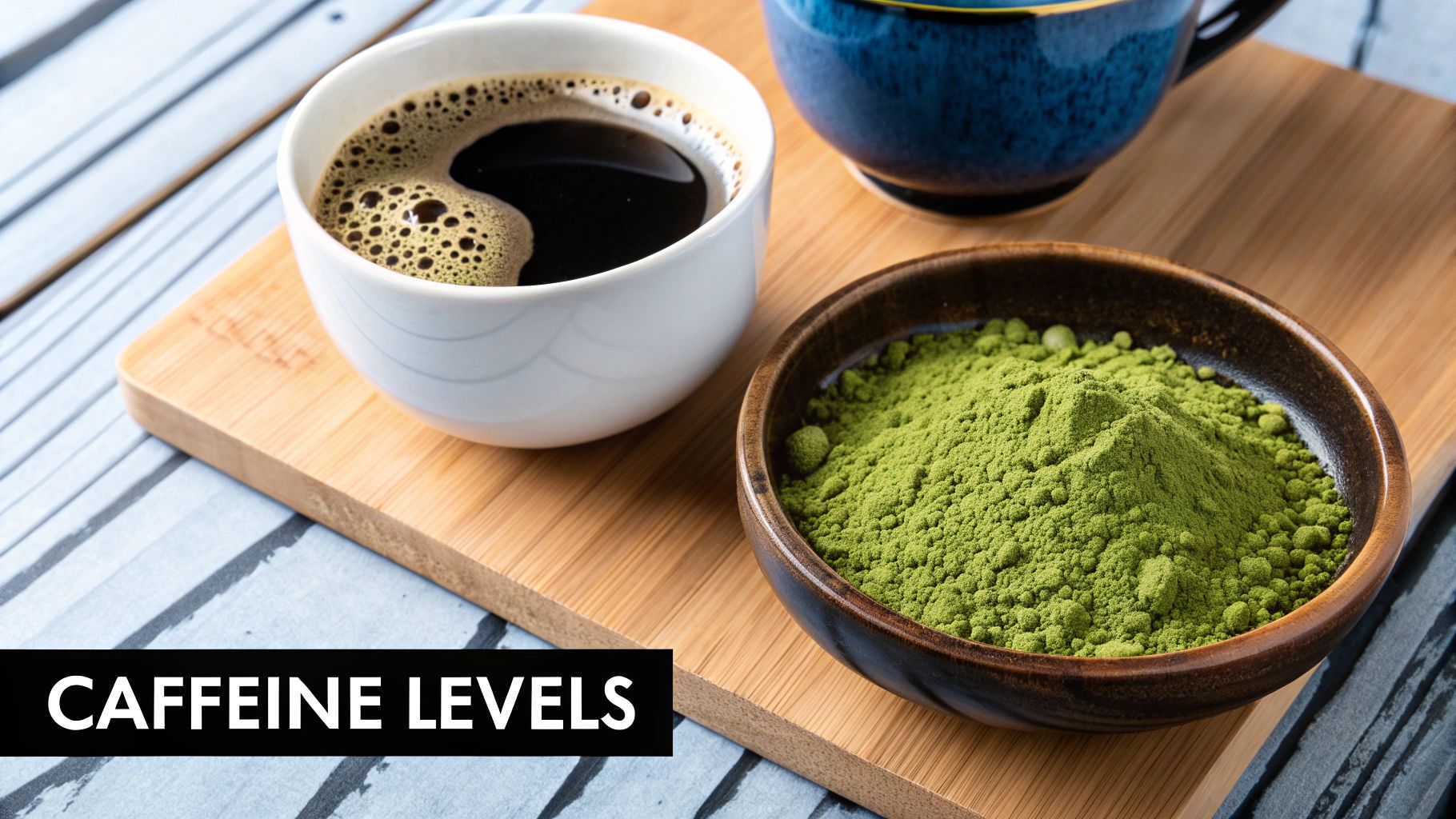
When we talk about whether matcha is better than coffee, the most striking difference is how the caffeine feels. Both give you that welcome lift, of course, but the way they deliver it creates two completely different experiences, both mentally and physically. It’s a good reminder that not all caffeine is created equal, and knowing the difference is key to picking the right brew for the moment.
Coffee is famous for its immediate, powerful punch. The caffeine hits your bloodstream fast, giving you a sharp spike of energy that feels fantastic when you’re trying to shake off sleep. But that rapid-fire delivery is a bit of a double-edged sword.
This sudden jolt can often bring on the jitters, restlessness, or even a touch of anxiety, especially if you’re sensitive to caffeine. It's the kind of energy that can leave you feeling wired but not necessarily focused. And once that peak wears off, the dreaded "caffeine crash" often follows, leaving you feeling even more drained than before.
The Coffee Energy Curve: A Rapid Rise and Fall
Picture coffee's energy boost as a steep hill. You race to the top, hitting a peak of alertness in about 30-60 minutes, but the journey back down is just as quick. This can easily trap you in a cycle where you find yourself reaching for another cup just to beat the slump, leading to a rollercoaster of energy levels all day.
This kind of quick-hit energy definitely has its place. An espresso before a workout, for instance, can be just the ticket for a short, intense gym session. But for anything that requires your full concentration for more than an hour, it often falls short.
Matcha’s Unique Calm Alertness
Matcha delivers a completely different kind of energy—one that’s smoother, longer-lasting, and far more balanced. The secret ingredient here is a remarkable amino acid called L-theanine, which is found in abundance in shade-grown matcha green tea.
L-theanine works hand-in-hand with caffeine. Instead of letting the caffeine flood your system all at once, it slows down its absorption. The result is a gradual release of energy that lasts for 3-6 hours, which means you get to skip the sharp spikes and subsequent crashes that coffee drinkers know all too well.
The real game-changer in matcha is L-theanine. It encourages the production of alpha brain waves, which are linked to a state of 'calm alertness'—the same focused, relaxed state you might find during meditation.
This unique partnership means you get sustained energy without the jitters. It’s a clean, clear-headed focus that’s brilliant for productivity and creativity, making it a far better choice for long work sessions, studying, or any task demanding deep thought. The feeling is alert and engaged, yet calm and centred. To get into the science of it, you can explore our detailed guide on matcha's caffeine content compared to coffee.
Here in the UK, coffee is often the default choice, almost out of habit. With around 98 million cups of coffee consumed daily, it's clear the quick-fix energy model is deeply ingrained in our culture. This is fuelled by a robust coffee shop scene, where 80% of people visit at least once a week. While matcha is definitely gaining traction, coffee is still the reigning champion.
Practical Scenarios: Choosing Your Energy Source
Once you understand these different energy curves, you can be much more intentional with your choice. Here’s how that might look in a few real-world situations:
- For a Creative Project: If you’re a writer, designer, or programmer about to dive into a few hours of deep work, matcha is the clear winner. Its sustained, calm focus helps you get into a flow state without the distracting jitters coffee can bring.
- For a High-Stakes Meeting: When you need to be sharp, articulate, and composed, matcha gives you the mental clarity and calm alertness to perform at your best, without a hint of anxious energy.
- For a Quick Physical Boost: If you’ve only got 45 minutes for a workout and need energy now, a quick shot of espresso might be more suitable. Its fast-acting nature is perfectly matched to short bursts of intense physical activity.
Ultimately, the caffeine experience from matcha is fundamentally different. It’s not just about staying awake; it’s about achieving a productive, balanced state of mind that empowers you to tackle your day with steady, reliable energy.
Comparing the Unique Health Benefits
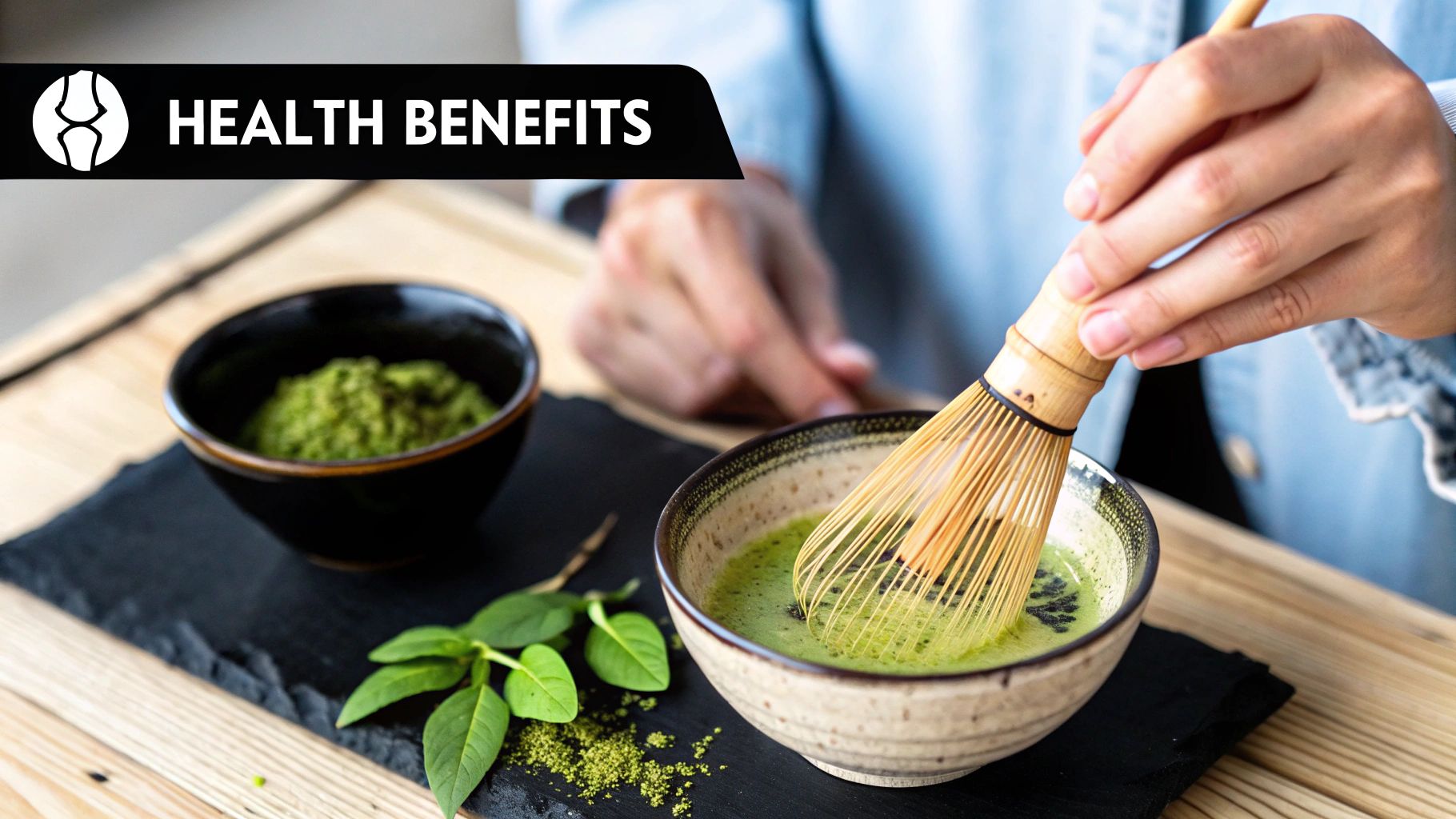
While the caffeine kick is often the first thing people compare, the real conversation about matcha versus coffee gets interesting when you look at their distinct health profiles. Both drinks offer more than just a jolt of energy; they each bring unique advantages to the table that can support your long-term wellness.
Coffee has certainly earned its reputation for a few health perks. It’s a known source of antioxidants and has been linked in some studies to a reduced risk for certain health conditions. But matcha's nutritional profile is in a different league altogether. Why? Because when you drink matcha, you're consuming the entire tea leaf, not just a watery infusion.
This simple difference in consumption means you get a potent concentration of vitamins, minerals, and phytonutrients that coffee just can't offer. It’s this fundamental detail that sets the stage for matcha's impressive range of health-supporting properties.
The Antioxidant Powerhouse: EGCg
If there’s one standout health advantage to matcha, it’s the extraordinary antioxidant content, especially a catechin called epigallocatechin gallate (EGCg). Coffee has antioxidants, but matcha is simply on another level. In fact, research shows it contains up to 137 times more EGCg than your standard steeped green tea.
This powerful compound is a real workhorse for your body. EGCg is celebrated for its ability to fight cellular damage from free radicals, which helps protect your body against chronic disease and even slows down the ageing process. Its benefits are broad and genuinely impactful.
Here’s a quick look at what this antioxidant powerhouse can do for you:
- Supports Cellular Health: By neutralising those damaging free radicals, EGCg helps shield your cells from oxidative stress—a key factor in maintaining good health over the long haul.
- Boosts Metabolism: Some studies suggest that EGCg can help increase metabolic rate and encourage fat oxidation, making matcha a fantastic partner for your fitness and weight management goals.
- Promotes Skin Clarity: The anti-inflammatory properties of EGCg can help calm down skin redness and irritation, contributing to a clearer, more radiant complexion.
For anyone prioritising vibrant skin and a healthy glow, the high EGCg content in matcha makes it an obvious choice. Our Amatsu Radiance blend is specifically designed for this, combining premium matcha with marine collagen to nourish your skin from the inside out.
A Gentler Approach to Digestion
Another crucial point of difference is how each drink treats your digestive system. Coffee is notoriously acidic, and for many people, that's a real problem. This acidity can trigger heartburn, indigestion, or general stomach upset, especially if you drink it on an empty stomach.
Matcha, on the other hand, is much gentler on the gut. It has a lower acidity and is rich in chlorophyll, which is known for its cleansing and soothing properties. This makes it a far better option for anyone with a sensitive stomach or who simply finds coffee too harsh.
You really notice this first thing in the morning. Starting your day with matcha gives you that clean energy boost without the risk of digestive drama, setting a much more comfortable and balanced tone for the hours ahead.
Aligning Your Drink with Your Wellness Goals
Ultimately, both drinks offer health benefits, but their strengths lie in different areas. The best choice often comes down to matching your drink to your specific wellness aims.
Coffee has its place, of course. But the unique synergy of compounds in matcha—the L-theanine for calm focus and the EGCg for cellular health—provides a more holistic suite of benefits for a powerful daily wellness ritual. Our Amatsu Pure ceremonial grade matcha is the perfect way to experience these full-spectrum benefits for yourself.
In the UK, coffee is a deeply ingrained ritual, with the average Brit spending around £16 per month on beans for home brewing. The industry's massive scale, projected to hit £6.1 billion in out-of-home spending by 2025, just shows its cultural dominance. While matcha is still the challenger, its compelling wellness profile is quickly winning people over.
When you choose matcha, you're opting for a drink that doesn't just energise your mind but actively nourishes your body. For a deeper dive, check out our complete guide on the numerous health benefits of matcha powder.
How They Shape Your Mental Clarity and Focus
Beyond just the physical energy kick, the real question for many of us is how each drink shapes our ability to think clearly. It often comes down to the quality of focus they provide. Coffee is brilliant for that immediate jolt of alertness, but that energy can sometimes feel a bit frantic or scattered, making it hard to settle into deep, complex tasks. It can pull your attention in a dozen directions at once, leaving you feeling more wired than truly focused.
Matcha, on the other hand, seems to cultivate a completely different mental state. The magic ingredient here is L-theanine, an amino acid found in abundance in shade-grown green tea leaves. It works beautifully with caffeine, smoothing out the sharp edges and promoting what many describe as ‘relaxed alertness’. This isn't just about being awake; it's about finding a calm, clear-headed focus that’s perfect for deep work, studying, or creative brainstorming.
What's happening here is actually rooted in your brain activity. L-theanine encourages the production of alpha brain waves—the very same brain waves that are prominent during meditation or when you're completely lost in a creative project. This is the neurological foundation for getting into that elusive 'flow state', where you feel totally absorbed and effortlessly productive.
Calm Focus vs. Scattered Energy: A Real-World Look
This difference becomes incredibly obvious when you look at everyday situations. Think about a programmer trying to hunt down a single bug in thousands of lines of code. The jittery, high-octane energy from a strong coffee could make that painstaking work feel frustrating. Your mind might race, jumping from one potential fix to another without the patience to think methodically.
Now, imagine that same programmer with a warm bowl of matcha. The calm, sustained focus it provides makes it easier to be patient and systematic. The mind stays sharp but loses that anxious edge, making it much easier to trace complex logic and spot that tiny, hidden error.
When it comes to demanding mental work, the choice becomes clear. Coffee gives you the raw power to stay awake, but matcha delivers the composed clarity needed to perform at your peak. It sharpens your mind without sacrificing your calm.
It’s a similar story for a designer trying to brainstorm new ideas. They need mental flexibility and an open mind, not a high-strung buzz. The gentle lift from matcha can help quiet the mental clutter, creating the perfect headspace for new ideas to connect and grow.
Taking Your Focus to the Next Level
If you want to push this cognitive support even further, you can combine matcha with other functional ingredients. Certain adaptogenic mushrooms, for instance, are well-known for their ability to enhance mental performance and help the body cope with stress.
This is exactly the thinking behind our Amatsu Shrooms blend. We’ve taken our premium ceremonial grade matcha and paired it with powerful adaptogens like Lion's Mane and Cordyceps. Lion's Mane is celebrated for supporting neuron growth and cognitive function, while Cordyceps is fantastic for boosting energy and fighting off mental fatigue.
This potent combination gives you a drink that not only delivers the calm focus of traditional matcha but also actively supports long-term brain health. It's an ideal daily ritual for professionals, students, and creatives who need to bring their A-game day in and day out.
Ultimately, choosing matcha isn't just about picking a caffeine source. It’s about choosing a tool to help you cultivate a more focused, creative, and resilient mind. The experience goes far beyond a simple energy boost into the realm of true cognitive enhancement.
The Daily Ritual: Mindful Practice vs. Quick Fix
How you start your morning sets the tone for the rest of your day. When it comes to your daily brew, the choice between matcha and coffee is about more than just flavour or caffeine—it’s a choice between two completely different rituals. One is often a rushed grab-and-go, while the other is an invitation to start your day with calm intention.
For most people, making coffee is a function, not a ritual. You press a button on a machine, pour hot water over some granules, or grab a takeaway cup on a frantic commute. It’s a transaction built for speed, a quick fix to jolt yourself awake. And while it’s certainly effective, that process rarely offers a moment to pause, breathe, and actually prepare your mind for the day ahead.
Preparing matcha, on the other hand, is an experience in itself. It's a simple, almost meditative practice that transforms your morning drink from a mere stimulant into a moment of mindfulness. This brief ritual forces you to slow down, even if just for a minute, and be present.
Crafting a Moment of Calm
The traditional way of making matcha is beautifully simple, yet deeply satisfying. You don’t need any complex gadgets or barista training; it’s all about a few intentional steps that take less than two minutes but can completely shift your mindset.
The process boils down to a few key actions:
- Sift the Powder: Gently sift a teaspoon of vibrant green matcha into a bowl. This simple step is crucial for preventing clumps and getting that smooth, velvety texture.
- Add Warm Water: Pour in a small amount of hot (but not boiling) water.
- Whisk with Intention: Using a bamboo whisk, known as a ‘chasen’, you whisk the mixture in a quick 'W' or 'M' motion. Watching the fine powder dissolve into a delicate foam is surprisingly grounding.
This two-minute ritual is a powerful antidote to a hectic, always-on lifestyle. It carves out a small pocket of peace, allowing you to centre yourself before the day’s demands kick in.
By transforming your morning caffeine habit into a mindful practice, you're not just waking up your body; you're calming your mind. This intentional start sets a focused and composed tone that can carry you through the rest of your day.
More Than a Beverage, It's a Mindset
Ultimately, this difference in preparation highlights a core philosophical split. The coffee routine often reinforces a mindset of haste and immediacy—it’s about getting the energy you need, as fast as possible, so you can move on to the next thing.
The matcha ritual, however, cultivates a mindset of presence and purpose. It’s a small act of self-care, a conscious choice to begin your day with a moment of tranquillity. For anyone looking to bring more balance and intention into their life, this simple daily practice is a surprisingly powerful tool. It shows that matcha offers more than just a drink; it provides a meaningful experience.
When you look at them side-by-side, one offers a quick solution while the other presents a holistic experience. To explore how this translates into clean energy and overall wellness, you can discover why matcha is often better than coffee in our detailed guide.
Choosing a Sustainable and Ethical Brew
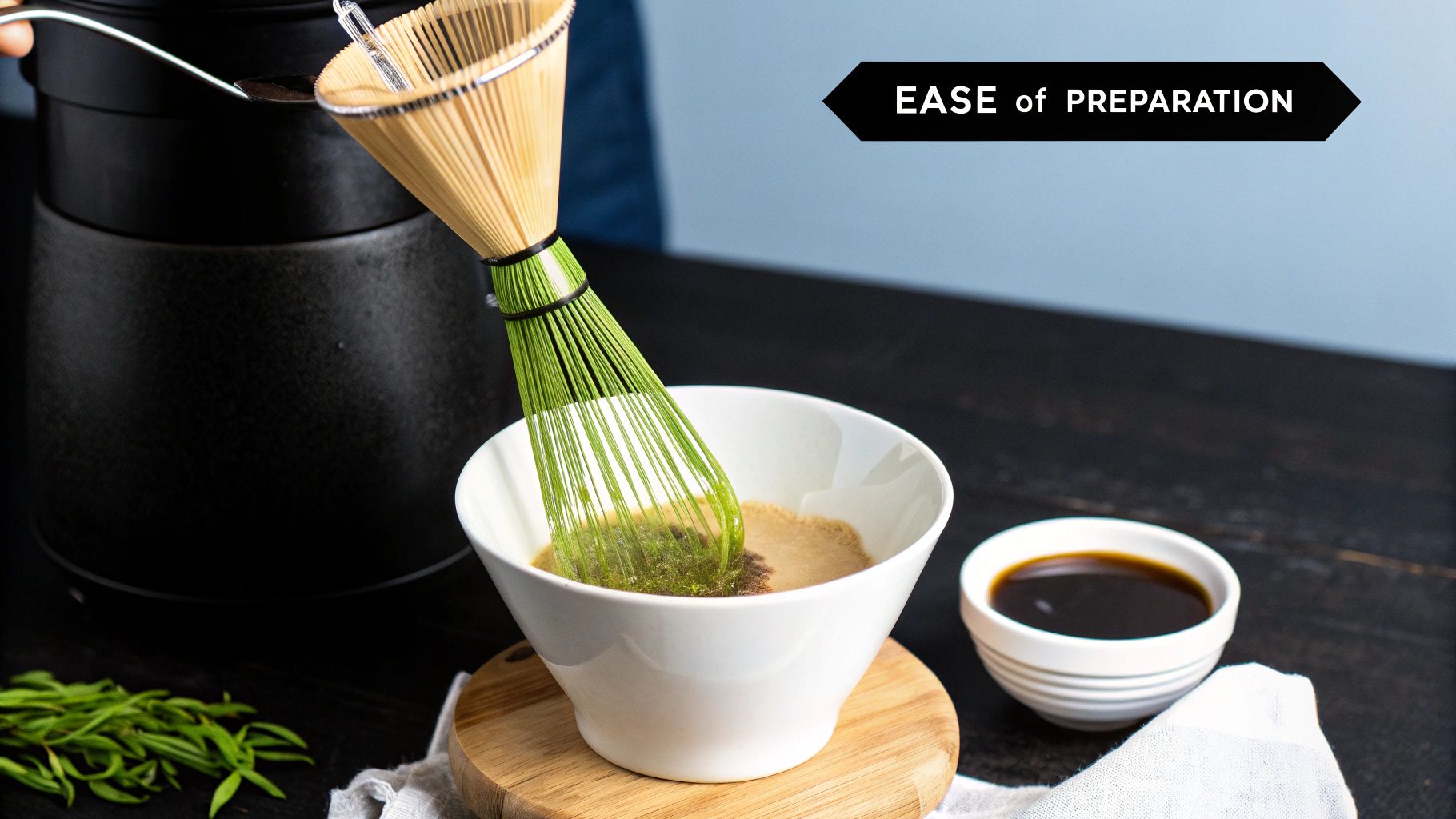
For many of us, the story behind our daily cup is just as important as the taste. When weighing up matcha versus coffee, it's worth looking at their environmental and ethical footprints. A truly conscious choice goes beyond flavour and energy; it’s about understanding how each drink affects our planet.
The massive global demand for coffee has, unfortunately, come at a high environmental price. Conventional coffee farming is often tied to serious issues that strain natural resources. Deforestation to clear land for vast, sun-grown coffee monocultures can wreck ecosystems and slash biodiversity.
On top of that, coffee production is an incredibly thirsty process. It can take up to 140 litres of water to produce a single cup of coffee—a staggering figure that puts immense pressure on local water supplies. This problem is made worse by the waste from single-use pods and packaging, adding to landfill issues worldwide.
Matcha and a More Harmonious Approach
In contrast, traditional matcha cultivation often follows a far more sustainable model. The practice of shade-growing, which is crucial for developing matcha's unique flavour and rich nutrient profile, naturally supports a healthier ecosystem.
The shade cloths or natural tree canopies don't just protect the tea plants; they also encourage biodiversity by creating a habitat for various insects and birds. This method promotes better soil health, as the plants are grown in harmony with their surroundings rather than in disruptive monocultures. High-quality, organic matcha farming is built on principles that respect and preserve the land's natural balance.
Choosing a high-quality matcha is not just a vote for a superior beverage; it's a vote for a more sustainable agricultural practice that honours the environment. It aligns your daily ritual with a commitment to planetary health.
While ethically sourced and "Rainforest Alliance" certified coffee options are certainly out there and should be supported, the conventional industry still has a long way to go. The very nature of premium matcha production, especially from brands like Amatsu Matcha, is rooted in these more sustainable, time-honoured traditions.
The UK Consumer and Ethical Choices
Here in the UK, we’re becoming more aware of sustainability, and it’s changing how we think about our daily habits. While instant coffee is still a staple for 73% of the UK population, there's a clear shift towards traceable, organic, and eco-friendly options. Matcha’s inherently gentler production process really appeals to this growing group of conscious consumers, even as coffee culture remains dominant. You can dig into more UK coffee consumption statistics on yorkemporium.co.uk.
By choosing a premium, organic matcha, you’re not just picking a drink for its calm energy and health benefits. You’re actively supporting a system of agriculture that is kinder to the earth, ensuring your daily moment of mindfulness doesn't come at the planet's expense. It turns your daily cup into a small but meaningful act of sustainability.
Common Questions About Switching to Matcha
Thinking about making the switch from coffee? It can feel like a big move, and it's natural to have a few last-minute questions about taste, preparation, and cost. Let's clear up some of the most common worries that hold people back.
Getting straight answers is the best way to figure out if matcha is the right fit for your daily routine.
I Dislike Green Tea, Will I Enjoy Matcha?
This is probably the biggest misconception out there. Many people who can't stand the bitter taste of regular green tea end up loving high-quality matcha. Ceremonial grade matcha, like our Amatsu Pure, is in a completely different league. It has a smooth, creamy, and almost savoury 'umami' flavour that you just don't get from a teabag.
Once you whisk it into a latte, the rich, velvety texture creates a satisfying experience that feels both luxurious and genuinely nourishing. It's complex without the sharp, grassy notes that put so many people off green tea. In fact, you can read more about why Londoners are ditching coffee for matcha in our Covent Garden guide.
Is Making Matcha at Home Complicated or Expensive?
Not in the slightest. Once you get the hang of it, a daily matcha ritual takes less than two minutes. All you truly need is the powder, some hot water, and a whisk to bring it all together.
While a traditional bamboo whisk (a 'chasen') is fantastic for creating that perfect, frothy layer, a simple electric frother works just as well and gets the job done quickly.
And what about the cost? While a tin of premium matcha might seem more expensive upfront than a jar of instant coffee, remember you only use a tiny 1-2 gram serving per cup. When you break it down, the price per drink is often very similar to what you'd pay for a specialty coffee at a cafe.
Can Matcha Help With My Fitness Goals?
Absolutely. Matcha makes for a brilliant pre-workout. The unique combination of caffeine and L-theanine gives you a steady stream of energy and sharp focus to power through your session, but without the jitters that can sometimes throw you off your game.
On top of that, research suggests the EGCg catechins in matcha can help boost your metabolism and increase fat oxidation during exercise. It's a clean, effective way to support your physical goals. Our Amatsu Strength blend is even formulated with creatine to take those fitness benefits to the next level.
Ready to discover a calmer, more sustained energy? The best way to understand the difference is to experience it yourself. Explore the Amatsu Matcha collection and find the perfect blend to elevate your daily ritual at https://amatsumatcha.com.
Read more
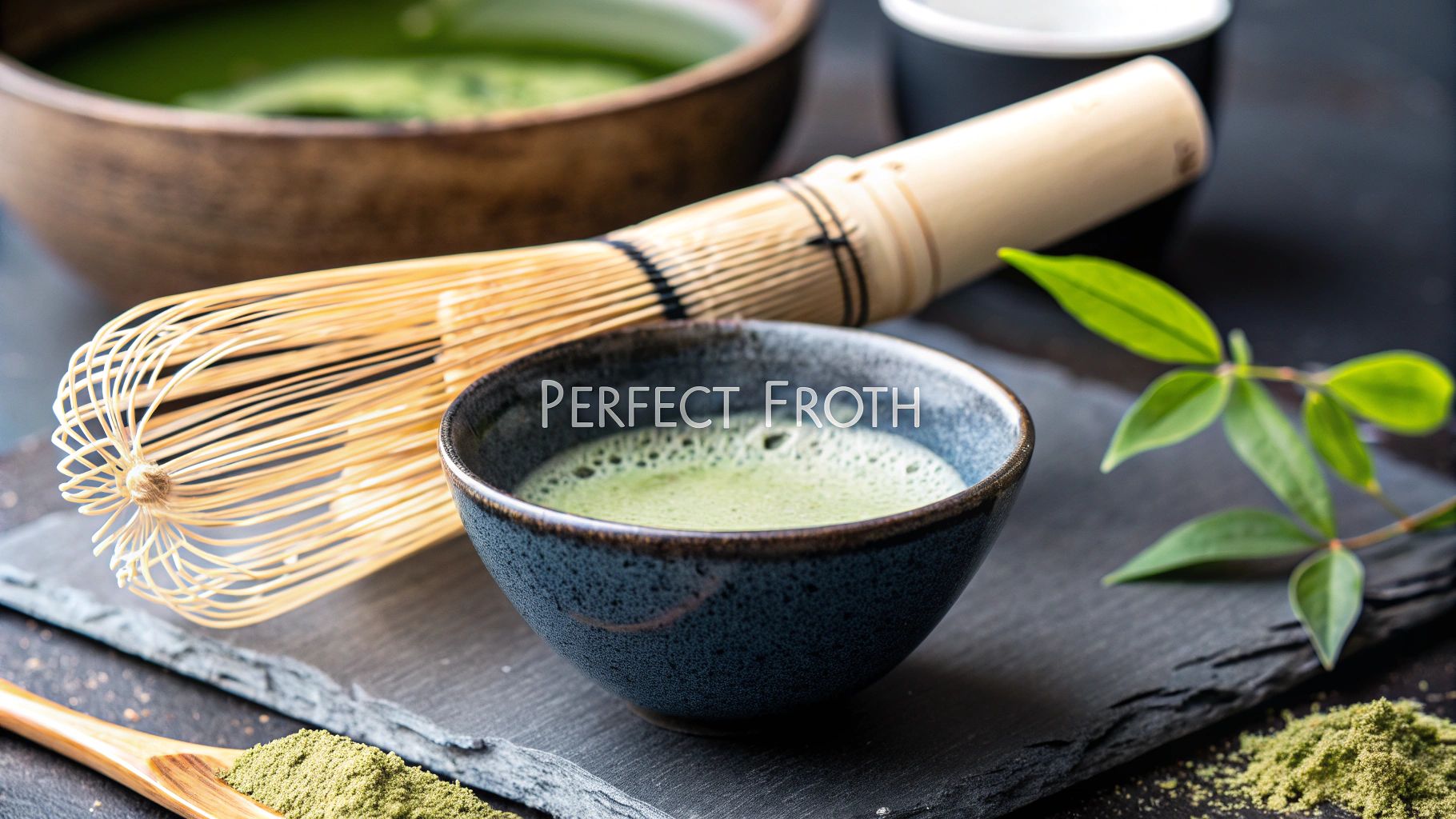
Tired of clumpy matcha? Learn the matcha whisk how to for a perfectly smooth, frothy tea. Master the chasen with our expert tips and techniques.
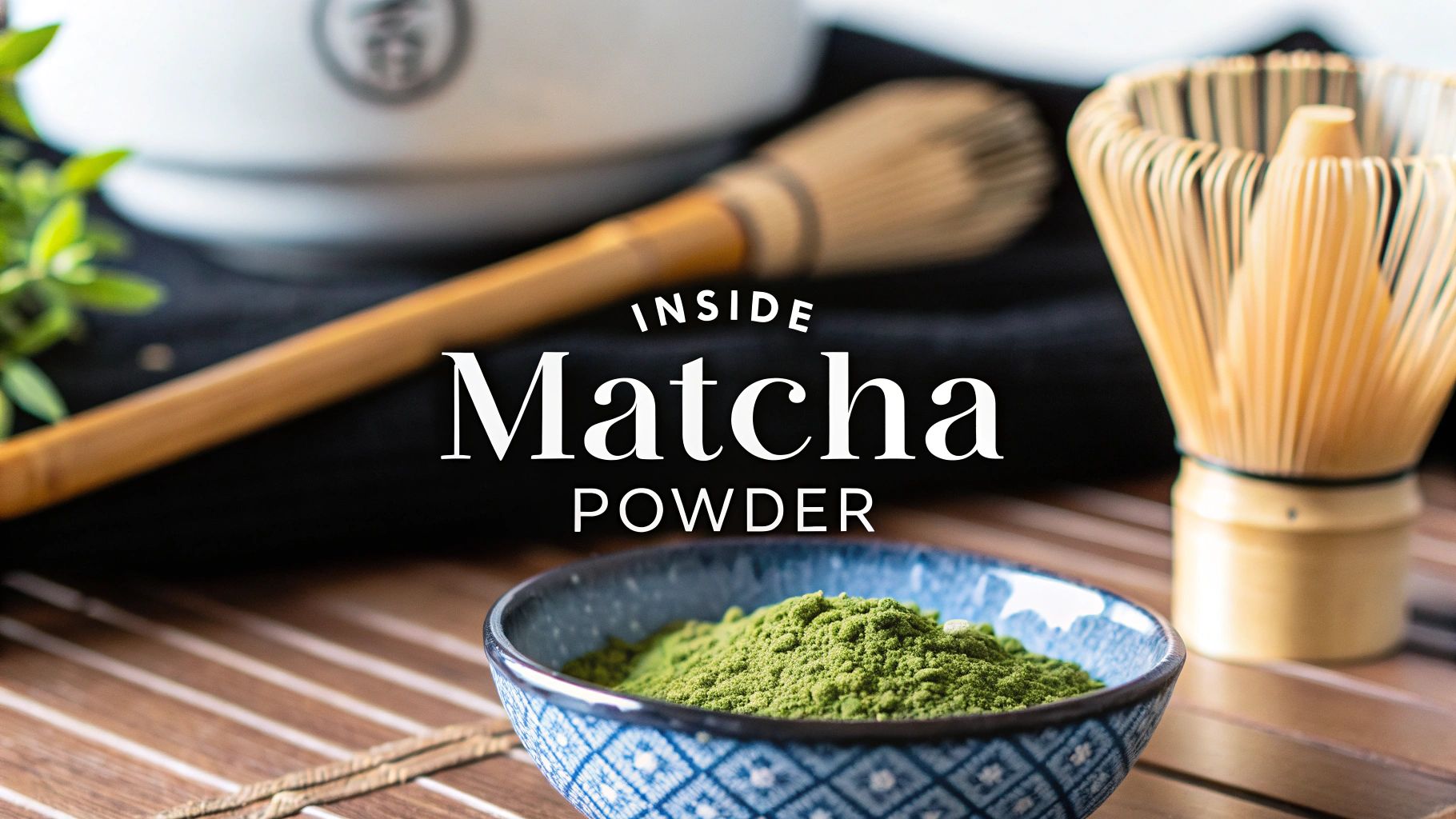
Curious what is in matcha powder? We break down the key nutrients, antioxidants, and compounds that make this vibrant green tea a true superfood.
